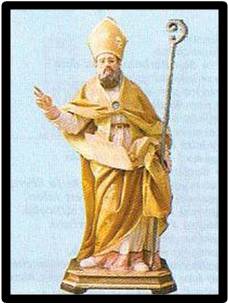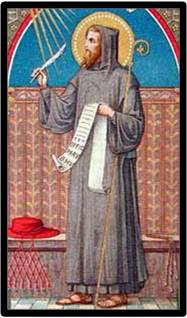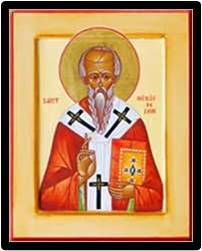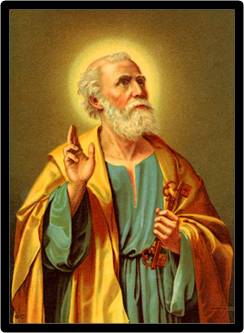
Barbatus was born in Benevento, Italy. He liked to read the Bible and as soon as he was old enough, he was ordained a priest.
Being a fiery preacher, he was made a pastor. Although he was very good at his work, his life as a pastor was not easy. St. Barbatus encouraged the people that belonged to his flock, to lead better lives. He reminded them to be sorry for their sins. Some people did not like him telling them how to live and were angry. They treated him very badly and finally forced him to leave.
Young St. Barbatus resigned from his parish and went back to Benevento where he had been born. He was received with great joy.
There were challenges in that city, too. Many converts to Christianity still kept pagan idols in their homes. They found it hard to destroy their good luck charms. They worshiped a golden viper and animal skin hung in a tree. They believed in magic powers.
St. Barbatus preached against such superstitions. But the people hung on to their false gods. The saint warned them that because of this sin, their city would be attacked by enemies and it was. The army of Emperor Constans besieged Benevento.
The people then listened to the preacher, soon gave up their error and peace returned. Barbatus then cut down the tree with his own hand, and melted down the golden viper to make a chalice for the altar.
St. Barbatus was made bishop. He continued his work to convert his people and assisted the Pope in a council. He died on February 29, 682, at the age of seventy.

St. Peter Damian was born at Ravenna, in Italy. His parents died when he was a child and he was left an orphan. He went to live with an older brother who mistreated him badly. He often left him hungry and starving and made him look after his herd of swine to earn his keep. Another brother named Damian found out about the trouble little Peter was having and brought him to his own home.
That was when Peter’s life changed completely. He was treated with love, affection and care. He was so grateful that when he became joined a religious order he took the name Damian after his loving brother. Damian educated Peter and encouraged his studies.
Peter later became a great teacher and taught at the university while he was in his twenties. But the Lord was directing him in ways he could never have thought of.
Peter lived in times when many people in the Church were more interested in collecting wealth. Peter realized that the Church is divine and has the grace from Jesus to save all people. He wanted the Church to shine with the holiness of Jesus.
After seven years of teaching, he decided to become a Benedictine monk. He wanted to live the rest of his life in prayer and penance. He would pray and make sacrifices so that many people in the Church would become holy. His health suffered when he tried to replace sleep with prayer.
He went to a monastery of St. Romuald and wrote a rule for the monks. He also wrote about the life of their holy founder, Romuald. Peter wrote many books about religious studies to help people deepen their faith.
Twice his abbot sent him to neighboring monasteries so he could help the monks change their lives so that they could live closer to God. The monks were grateful because Peter was so kind and respectful.
Peter was finally called from the monastery. He became a bishop and a cardinal. He was sent on very important missions for various popes throughout his long life. St. Peter Damian died in 1072 at the age of sixty-five. Because he was a champion of truth and a peacemaker, he was declared a Doctor of the Church in 1828.




